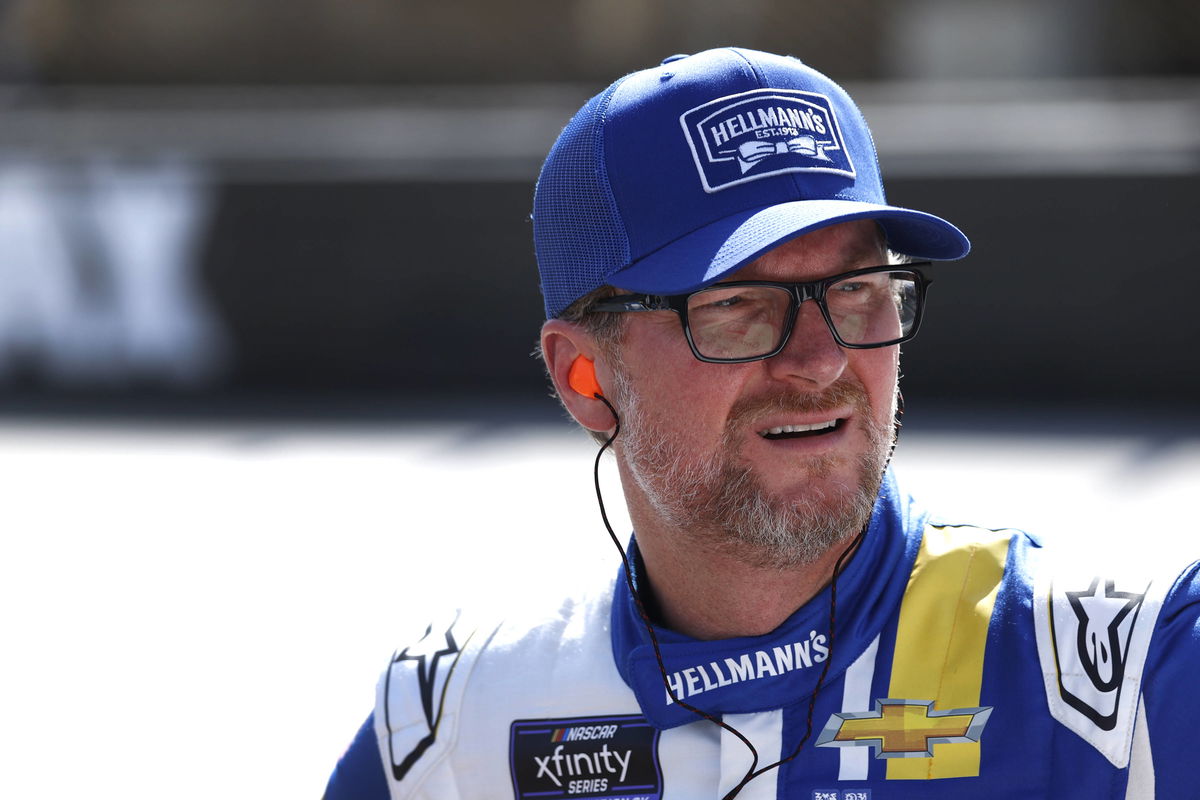
Imago
BRISTOL, TN – SEPTEMBER 20: Dale Earnhardt, Jr 88 JR Motorsports Hellmann s Chevrolet talks with members of his crew during practice for the NASCAR, Motorsport, USA Xfinity Series Food City 300 on September 20, 2024 at Bristol Motor Speedway in Bristol, TN. Photo by Jeff Robinson/Icon Sportswire AUTO: SEP 20 NASCAR Xfinity Series Food City 300 EDITORIAL USE ONLY Icon240920952300

Imago
BRISTOL, TN – SEPTEMBER 20: Dale Earnhardt, Jr 88 JR Motorsports Hellmann s Chevrolet talks with members of his crew during practice for the NASCAR, Motorsport, USA Xfinity Series Food City 300 on September 20, 2024 at Bristol Motor Speedway in Bristol, TN. Photo by Jeff Robinson/Icon Sportswire AUTO: SEP 20 NASCAR Xfinity Series Food City 300 EDITORIAL USE ONLY Icon240920952300

Imago
BRISTOL, TN – SEPTEMBER 20: Dale Earnhardt, Jr 88 JR Motorsports Hellmann s Chevrolet talks with members of his crew during practice for the NASCAR, Motorsport, USA Xfinity Series Food City 300 on September 20, 2024 at Bristol Motor Speedway in Bristol, TN. Photo by Jeff Robinson/Icon Sportswire AUTO: SEP 20 NASCAR Xfinity Series Food City 300 EDITORIAL USE ONLY Icon240920952300

Imago
BRISTOL, TN – SEPTEMBER 20: Dale Earnhardt, Jr 88 JR Motorsports Hellmann s Chevrolet talks with members of his crew during practice for the NASCAR, Motorsport, USA Xfinity Series Food City 300 on September 20, 2024 at Bristol Motor Speedway in Bristol, TN. Photo by Jeff Robinson/Icon Sportswire AUTO: SEP 20 NASCAR Xfinity Series Food City 300 EDITORIAL USE ONLY Icon240920952300
Playoff races in NASCAR are already intense, but recently, the spotlight has shifted to something off the track. Of late, heavy emphasis is laid on what drivers and spotters say over the radio. Teams are being warned or penalized for simply mentioning points, standings, or giving strategic guidance. NASCAR says it’s about preventing race manipulation, but many insiders like Dale Earnhardt Jr. feel that the rules are becoming too strict.
The controversy isn’t new, but recent events have made it more visible. During the Charlotte race, Denny Hamlin passed Ross Chastain on the final lap, which helped Joey Logano advance to the next playoff round. Hamlin himself said he “would not have passed him” if he’d known the points situation. On his podcast, Dale Jr used Hamlin’s example to spotlight a deeper issue within NASCAR’s rule enforcement.
Dale Earnhardt Jr. voices concerns over radio policing
Junior explained that Hamlin’s crew chief, Chris Gabehart, told him afterward that the team had been “sensitive” on the radio because of what happened at Martinsville last year, where NASCAR handed down penalties for ‘race manipulation’. He cited another incident where “Zilisch’s team got warned for merely mentioning what the point situation was,” adding that NASCAR immediately shut it down.
For him, that’s where the sport is overreaching. “I have zero problem with any spotter saying, ‘Here’s the point situation,’” he argued, pointing out that strategy and awareness are part of racing itself.
He added how small actions, even ones that affect points, are a normal part of racing. For example, consider Cole Custer and Alex Bowman trailing Joey Logano at Charlotte. Their positioning and radio talk sparked discussion. According to Earnhardt Jr., this was exactly the kind of on-track calculation that has always been part of the sport.
“And honestly, there’s all these videos. Was Cole Custer not trying to pass the 22? Was Bowman not trying to race the 1? Who cares at this point?” he said. “Let whatever happen… as long as it ain’t super egregious.” His concern shed light on how NASCAR’s current policing may overreact to routine strategy.
Seems like Alex Bowman (apparently) also got a stand down order on the final lap once he caught Ross Chastain.
“Easy with it. Take care of your tires here.”
“Take care of your tires.” https://t.co/i8qNDiHyET pic.twitter.com/trIE3Y6uwB— Steven Taranto (@STaranto92) October 6, 2025
History, Junior argued, shows these gray areas have always existed. He then brought up a famous example: The 1991 Winston 500 at Talladega. Harry Gant had run out of fuel on the final lap. “Harry Gant ran out of gas… Rick Mast pushed him around the track, probably at a decreased speed of maybe 10, 15, 20 miles an hour, and Harry wins the race. Nobody cared,” Earnhardt Jr. said.
He also pointed to how subjective enforcement has become. “It is a judgment. There’s no line. There won’t be a line in this situation. It’s just… if it feels like sh-t, it’s sh-t,” he said. NASCAR officials review transcripts, deliberate in small groups, and decide if anything crossed the line. But there’s no objective measure, just interpretation.
Ultimately, Dale Jr compares it to baseball: every umpire sees a play differently. This subjectivity explains why teams like Connor Zilisch’s Xfinity squad were warned for simply reading points over the radio.
Dale Jr. identifies what’s missing from NASCAR’s playoff format
For many drivers and fans, the playoffs amplify tension. Historically, the long season allowed multiple drivers to build recognition over time, creating stars gradually. But Dale Jr. feels that this is not the case today. The narrative often revolves around just a handful of playoff contenders, leaving consistent performers and star power in the shadows.
Dale Jr. also admitted he doesn’t have all the answers. “I am not sure what is right,” he said, framing the discussion with honesty. He then laid out how a season-long format would function differently.
“If you have a season-long format, you basically start the season with everybody in the bucket at Daytona,” he explained. “After about 10 races you are talking only about five or six guys. Three, four guys going for it with a few races left. That is how you basically are putting the focus on specific individuals for a sustained period of time throughout the year…And those guys typically tend to be the same ones year after year after year, and that does in turn create a star.”
He even suggested applying psychology studies to understand fan behavior. “I think there’s a university somewhere with some psychology majors that would be able to help us understand this.” By framing the problem through both performance and fan experience, Dale Jr. pointed out that the issue is more than numbers.



